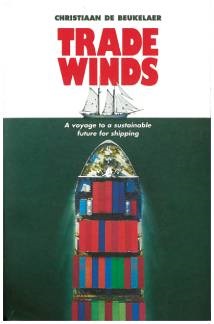Can we blow away maritime's carbon crisis?
Trade Winds, by Christiaan De Beukelaer
With m aritime decarbonisation well and truly on the agenda, there has been a recent surge of interest in wind propulsion for cargo vessels. Christiaan De Beukelaer is a Fellow of the Royal Geographical Society whose sailing hobby led him to explore the possibilities of using this old-fashioned method in modern supply chains, and he has written this fascinating account of what it is like to put wind power into practice.
aritime decarbonisation well and truly on the agenda, there has been a recent surge of interest in wind propulsion for cargo vessels. Christiaan De Beukelaer is a Fellow of the Royal Geographical Society whose sailing hobby led him to explore the possibilities of using this old-fashioned method in modern supply chains, and he has written this fascinating account of what it is like to put wind power into practice.
Like our featured book in the previous issue of the Telegraph, Trade Winds focuses on a voyage that was unexpectedly disrupted by the Covid-19 pandemic. De Beukelaer joined Avontuur, the world's largest sailing cargo vessel, in the Canary Islands for a voyage to pick up rum, coffee and cacao in the Caribbean and transport them to Germany. He was hoping to spend three weeks finding out more about the movement to bring back emission-free propulsion. Instead he found himself trapped onboard for five months.
This adds an element of tension and adventure to an account of how entrepreneurs and sailing enthusiasts are attempting to make a difference for the planet by transporting goods the traditional way, rather than relying on what De Beukelaer calls 'horrendously polluting, but frighteningly convenient, fossil fuels'.
The book is very well written, and it is interesting to read about the practical details of navigation, work and social life onboard such an unusual vessel. There are also maps, illustrations and images of the vessel during its voyage.
Potential readers who wonder whether this will book will be a lecture on environmentalism can be reassured that it is a fair account. It's clear where De Beukelaer's heart lies – he shows that the well-meaning attempts to transport goods by wind ship can inspire hope that a different kind of global economy is possible. However, he is also honest in his scepticism about whether a large-scale transformation to this planet-friendly propulsion system is ultimately possible. He doesn't shrink from the challenges involved, from the amount of timber required to build sailing vessels to the need for maritime professionals with particular specialist skills.
Still, the advocates for wind technology aren't going to give up. Only time will tell if they are successful in making a real difference to the maritime industry's carbon emissions.
Trade Winds: a voyage to a sustainable future for shipping
By Christiaan De Beukelaer
Manchester University Press, £20.00
ISBN: 978 15261 163097
Buy this book in the Nautilus Bookshop
While you're there, why not browse the rest of the titles in our unique maritime bookshop, which sells all the books reviewed on these pages.
Buy nowMore Books
How to 'make it' in the superyacht industry
Superyacht Success, by Brendan O'ShannassyBack in 2022, we reviewed Brendan O'Shannassy's memoir Superyacht Captain. Now Capt O'Shannassy has returned with a new book that focuses on how crew can navigate their careers.
Love for seafaring conquers all
No Quitting, by Andrea BarkerAndrea Barker's memoir of her 1990s Merchant Navy cadetship tells of her eagerness and determination to follow the career pursued by generations of her family. Unfortunately, there were choppy waters ahead...
Radio revelry
Barques, Sparks and Sharks, by Len WilsonSeafarers are known for their story-telling abilities, and Orkney-born Len Wilson does not disappoint in this memoir of his years as a radio officer
Mastering our harbours
Harbours and Their Masters, by Mark Ashley-MillerNovice skipper Mark Ashley-Miller recently spent five years circumnavigating the UK and Ireland as a charity challenge – interviewing and photographing the harbour masters he met along the way.
